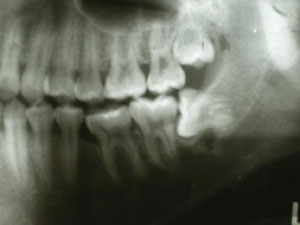Wisdom Teeth
Our expert team of oral & maxillofacial surgeons perform wisdom teeth removal in Takapuna – North Shore, Pakuranga – Auckland & Queenstown
Wisdom teeth removal
Problem wisdom teeth are one of the more common reasons for visiting an Oral & Maxillofacial Surgeon. Often a dentist will give a patient a specialist referral to see one of our surgeons and get an opinion about wisdom teeth before the teeth become painful.
The most common reason for a specialist referral is that wisdom teeth are generally easier and safer to remove from young mouths, or the dentist may have picked up a problem on an x-ray, such as an impacted tooth, which is a risk to the tooth in front.
Some of the reasons for wisdom teeth removal:
- Infection
- Tooth decay
- Food-trapping
- Cystic change
- To assist orthodontic treatment
- The likelihood of future problems
- To avoid increasing difficulty removing teeth when older and poor healing

How are wisdom teeth removed?
Our Oral & Maxillofacial Surgeon remove the wisdom teeth either under local anaesthesia alone, (dental injections), local anaesthesia with intravenous sedation (IV or twilight sleep), or local anaesthesia with general anaesthesia (GA).
Surgery usually involves raising gum flaps to gain access to the bone which surrounds the wisdom tooth. Some of this bone is removed with a drill (similar to the type used for dental fillings). The wisdom tooth is usually divided up to allow it to be removed in parts. The socket is washed out and the gum closed with dissolving stitches.
Upper wisdom teeth removal can often be easier than removing lower wisdom teeth.
There are some risks in wisdom teeth removal
For this reason, it is best to have surgery with someone experienced in the removal of wisdom teeth, which is why you received a specialist referral to one of our three dental practices in Takapuna, Pakuranga or Queenstown. You will hear more about the risks of removing wisdom teeth at your consultation with one of our oral & maxillofacial surgeons, but they are summarised below.
- All patients will experience numbness in the first 24 hours after surgery, due to the local anaesthetic injections given at time of dental procedure.
- Infection is uncommon. Antibiotics and mouthwash are routinely given to try and prevent this outcome.
- Tingling or numbness of the lip, chin or tongue due to the proximity of two nerves occurs in less than 1 percent of patients after removal of lower wisdom teeth. Usually this is temporary, lasting days or weeks. Problems that can result from permanent tingling or numbness include lip-biting, reduced ability to feel food on lip, tongue-biting, altered taste and possibly alteration to speech.
- Excessive bleeding. This is very uncommon.
- Dry socket. Occurs after less than 10% of lower wisdom tooth removals. The blood clot falls out early causing the socket to become dry and painful. This could occur up to a few days after extracting wisdom teeth. Typically, this is easily treated with a follow up appointment at the surgery.
- Jaw joint problems. Uncommon and usually last a few weeks.
What to expect after surgery to remove wisdom teeth
- Swelling. Maximum at 1-2 days. Lasts 5-7 days.
- Discomfort. Pain-relief medication is effective and will be required for 4-5 days after surgery.
- Limited mouth opening.
- Bruising.
- Tiredness after general anaesthesia may occur for a few days. Nausea or vomiting is unusual.
- Weakness of the jaw for several weeks.
Follow-up to surgery to remove wisdom teeth
Most people return to work or study 4-5 days after surgery. An appointment will be arranged for review if needed. Please call our dental practice to arrange one.